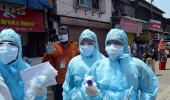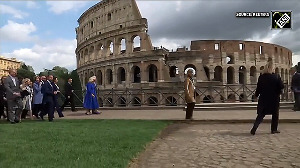Kunal Patil, a photojournalist based in Mumbai, who was treated to Sri H N Reliance Foundation Hospital after he tested positive for the dreaded virus, says he feels fortunate to come out of this nightmare.

As a photojournalist waiting to capture some of the most crucial happenings around me, nothing could have prepared me for a week as a COVID-19 patient.
While the viral outbreak engulfed Maharashtra and Mumbai, in particular, I continued documenting these unprecedented times, but a phone call on April 20 changed my life forever.
The morning began like any other as I prepared to head out for an assignment. I received a call from a photographer friend, who informed me that an official from the Brihanmumbai Municipal Corporation had confirmed that he tested positive for COVID-19 and would soon be taken to a hospital in an ambulance.
We had all undergone swab tests after a few of our fellow photojournalists had tested positive.
Soon, I received the dreaded phone call from an unknown number and a man asked me curtly, "Where are you? I am calling from the BMC and want to inform you that your report is positive."
It felt surreal but my first instinct was to prepare my family. I rushed home and waited outside, calling out to my parents and wife. I asked them not to touch me or come near me, as I sat at my doorstep waiting for the ambulance to arrive.
Meanwhile, I received a call from another friend who had tested positive. He told me that the civic body would quarantine asymptomatic patients at a hotel for the next 14 days.
As it seemed like it would take some time for the ambulance to arrive, I decided to head to the hotel in my car.

Once I reached there, I became an "untouchable". The moment I exited my car and some of my friends and other suspected patients came near the hotel entrance, I saw people from adjacent buildings and shops staring at us but the worse was yet to come.
A hotel staffer gave us our room numbers and threw water bottles and sanitisers at us from a six-feet distance. The next day (April 21) we were informed that we would have to collect food from near the elevator.
My wife called to inform me that five people from my housing society had tested positive for the virus and the complex would be sealed for the next 14 days. I was saddened to know that other residents were forced to stay indoors because of me and my friends and was worried that my family may test positive for the disease.
Soon a BMC ward officer told some of us to pack our bags as we were being shifted to another hotel. Within hours, a doctor informed us that patients suffering from co-morbid conditions such as hypertension and diabetes will be shifted to Seven Hills Hospital in Mumbai's suburban area of Andheri. I was among four media persons who were transported there.

Entering a hospital had never been so terrifying in the 39 years of my life. As we entered the gate, we saw a man standing with a sanitiser machine, who first sanitised us, then our bags and lastly, the ambulance we had travelled in.
I was admitted in a ward kept for patients from Sir H N Reliance Foundation Hospital in collaboration with the BMC, which has 56 COVID-19 beds at Seven Hills Hospital. That's when I met head training nurse Agnes Kuttiani.
"When the hospital officials asked us to serve COVID-19 patients, I was the first one to raise my hand. My husband was scared, but my daughter told me to do my duty," she said, beaming with pride, as I clicked her photograph.
My third day began with a second swab test at 5 am. This was was followed by an ECG and a basic parameter check. Soon I fell into the daily rhythm of the hospital, but my thoughts often went to my sexagenarian parents. They had undergone the swab test, while my wife and daughter were spared as they did not show any symptoms.
To keep negative thoughts at bay, I started speaking to the hospital staff, who kept the COVID-19 fight going despite the risks involved.
My conversations with Moroba Kamble, a cleaner, were the most memorable. "I do my job wholeheartedly; I don't know if it is great work. I only hope that if I get infected and die, I will be called a shahid (martyr). I am glad my family supports the work I do for patients and my country," Kamble said.

I also met Mahesh Kharvi, an autorickshaw driver who was working at the hospital during the crisis.
Kharvi told me once the lockdown was imposed, "My daughter asked me if I would be interested in working at the hospital, where she is employed. I immediately said yes. It is better to do something good for others than sit and whine about the situation."
Entering day five, they took my third swab and a doctor informed me that my second swab test had come out negative but the third test was to decide if I was out of the woods yet.
My sixth day at the facility began on a positive note, as I found out that my parents had tested negative. During the day, I met BMC's staff nurse Bageshree Sanap, who worked at KEM Hospital's COVID-19 care unit, before being shifted to Seven Hills Hospital. "Whenever I returned home after my duty at KEM, my neighbours would stare at me as if I was a terrorist. I was sad and applied for a transfer," said Sanap, who has now been put up at the Taj in Santacruz.
At the end of that day, Dr Pratibha Singhal, told me that I had tested negative in my third test. My joy was unparalleled. As I packed my bags, many of the hospital staff took selfies with me. I was also given an enthusiastic welcome by members of my housing society and it truly humbled me.
Even as I remain under home quarantine till May 9 and can only catch passing glimpses of my princess (my daughter), I feel fortunate to have come out of this nightmare, to wake up in the safe confines of my home.











 © 2025
© 2025